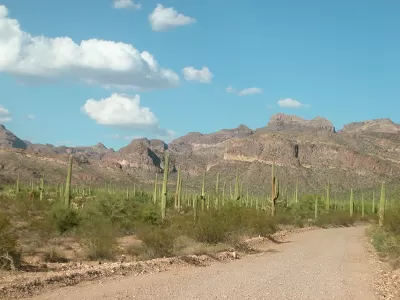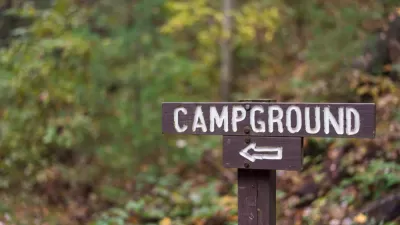Construction of a border wall would have grave social and environmental consequences, but retailers with clout are not stepping up as they have when other places have been threatened.

Jessica Kutz writes about the difference in support for threatened public lands by the recreation industry. When the Trump administration announced plans to scale back the borders of Bears Ears National Monument in Utah, companies like Patagonia sprang into action. But areas along the U.S.-Mexico border are also facing major threats from border wall construction, and activists say they are not receiving the same support.
"As a result, in places like Organ Pipe Cactus National Monument [in Arizona], saguaros are being ripped from the ground, and tribal nations will lose access to land sacred to them. Once it is built, the wall will sever wildlife habitat between the U.S. and Mexico. Conservationists and activists at the border are tirelessly documenting every development. But lately, they’ve begun asking themselves, 'Where is everyone else?'" says Kutz.
The larger story, notes Kutz, is about the lack of diversity in the outdoor recreation industry, both within companies and among consumers, and the resulting equity issues. When companies are motivated to represent the needs of their customers, the interests of people of color and poor people are not fully acknowledged. "Border residents who have deep ties to the landscape and its wildlife — but lack the money to buy products from companies like Patagonia, for example — are losing out on that sort of advocacy currency," adds Kutz.
FULL STORY: How Big Rec chooses its public-lands battles

Maui's Vacation Rental Debate Turns Ugly
Verbal attacks, misinformation campaigns and fistfights plague a high-stakes debate to convert thousands of vacation rentals into long-term housing.

Planetizen Federal Action Tracker
A weekly monitor of how Trump’s orders and actions are impacting planners and planning in America.

San Francisco Suspends Traffic Calming Amidst Record Deaths
Citing “a challenging fiscal landscape,” the city will cease the program on the heels of 42 traffic deaths, including 24 pedestrians.

Defunct Pittsburgh Power Plant to Become Residential Tower
A decommissioned steam heat plant will be redeveloped into almost 100 affordable housing units.

Trump Prompts Restructuring of Transportation Research Board in “Unprecedented Overreach”
The TRB has eliminated more than half of its committees including those focused on climate, equity, and cities.

Amtrak Rolls Out New Orleans to Alabama “Mardi Gras” Train
The new service will operate morning and evening departures between Mobile and New Orleans.
Urban Design for Planners 1: Software Tools
This six-course series explores essential urban design concepts using open source software and equips planners with the tools they need to participate fully in the urban design process.
Planning for Universal Design
Learn the tools for implementing Universal Design in planning regulations.
Heyer Gruel & Associates PA
JM Goldson LLC
Custer County Colorado
City of Camden Redevelopment Agency
City of Astoria
Transportation Research & Education Center (TREC) at Portland State University
Jefferson Parish Government
Camden Redevelopment Agency
City of Claremont





























